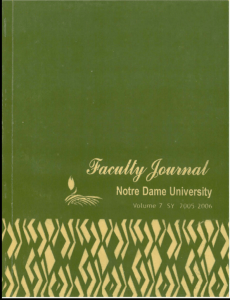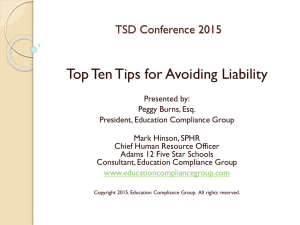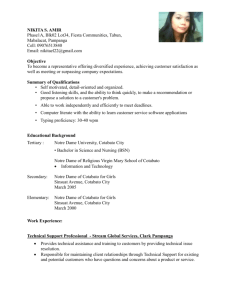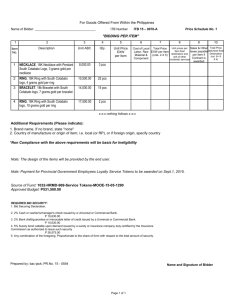DESIGNATION NAME MOBILE NUMBER/email
advertisement
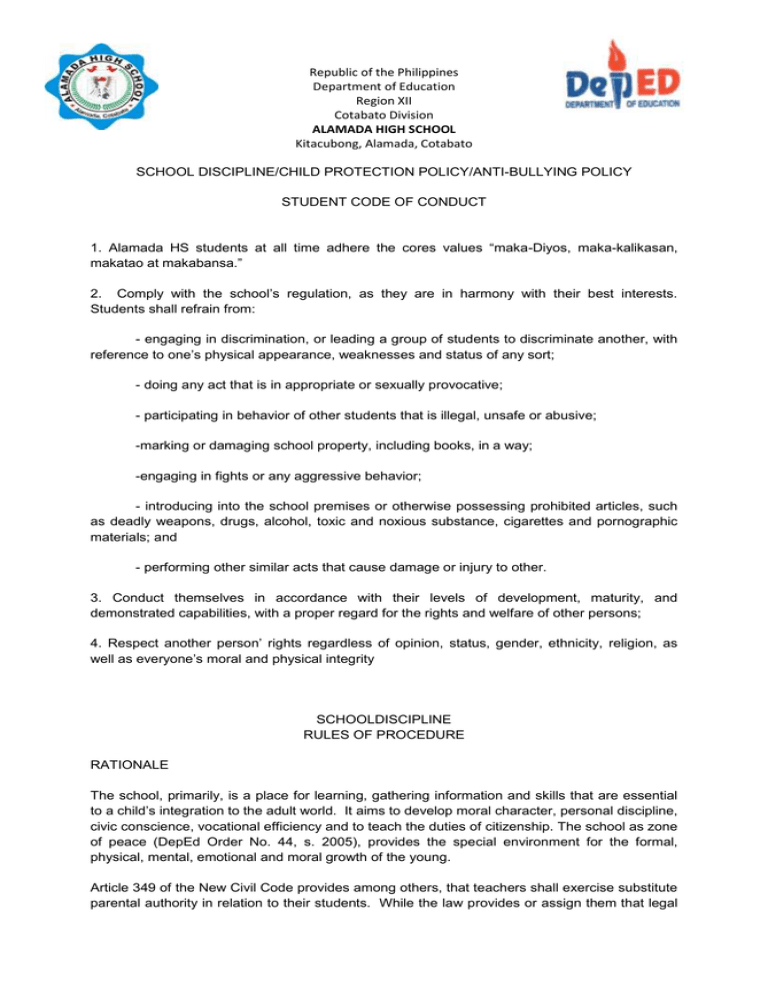
Republic of the Philippines Department of Education Region XII Cotabato Division ALAMADA HIGH SCHOOL Kitacubong, Alamada, Cotabato SCHOOL DISCIPLINE/CHILD PROTECTION POLICY/ANTI-BULLYING POLICY STUDENT CODE OF CONDUCT 1. Alamada HS students at all time adhere the cores values “maka-Diyos, maka-kalikasan, makatao at makabansa.” 2. Comply with the school’s regulation, as they are in harmony with their best interests. Students shall refrain from: - engaging in discrimination, or leading a group of students to discriminate another, with reference to one’s physical appearance, weaknesses and status of any sort; - doing any act that is in appropriate or sexually provocative; - participating in behavior of other students that is illegal, unsafe or abusive; -marking or damaging school property, including books, in a way; -engaging in fights or any aggressive behavior; - introducing into the school premises or otherwise possessing prohibited articles, such as deadly weapons, drugs, alcohol, toxic and noxious substance, cigarettes and pornographic materials; and - performing other similar acts that cause damage or injury to other. 3. Conduct themselves in accordance with their levels of development, maturity, and demonstrated capabilities, with a proper regard for the rights and welfare of other persons; 4. Respect another person’ rights regardless of opinion, status, gender, ethnicity, religion, as well as everyone’s moral and physical integrity SCHOOLDISCIPLINE RULES OF PROCEDURE RATIONALE The school, primarily, is a place for learning, gathering information and skills that are essential to a child’s integration to the adult world. It aims to develop moral character, personal discipline, civic conscience, vocational efficiency and to teach the duties of citizenship. The school as zone of peace (DepEd Order No. 44, s. 2005), provides the special environment for the formal, physical, mental, emotional and moral growth of the young. Article 349 of the New Civil Code provides among others, that teachers shall exercise substitute parental authority in relation to their students. While the law provides or assign them that legal Republic of the Philippines Department of Education Region XII Cotabato Division ALAMADA HIGH SCHOOL Kitacubong, Alamada, Cotabato authority of natural parents in a substitute capacity, they are however, answerable for any damage or injury caused on other people by the tortuous not of their students as long as the latter remain under their supervision and control. Pursuant to Section I, Chapter III, Part IV of 2000 DECS Service Manual, every school shall maintain discipline inside the school campus as well as the school premises when students are engaged in activities authorized by the school. As stated in paragraph 2, Section 6.2, Rule VI from Rules and Regulations of RA 9155 as mentioned in DepEd Order No. 1, s. 2003, the school head shall have authority, accountability and responsibility for creating an environment within the school that is conducive to teaching and learning. Thus, school officials and teachers shall have the right to impose appropriate and reasonable disciplinary measures in case of minor offenses or infractions of good discipline Teachers are duly license professionals who pass dignity and reputation with high moral values as well as technical and professional competence whom strictly adhere to observe and practice this set of ethical and moral principles, standard and values. (Code of Ethics of Professional Teachers Preamble) Section 1 Creation of School Discipline Committee. • There shall be a committee, which will handle grave/major offenses as stated in the 2000 DECS Service Manual. They shall be composed of chair, co-chair and member. The school principal shall designate school disciplinary officer per curriculum year level. He/she shall also designate curriculum chairman and class adviser per curriculum year level. Section 2 Duties and Responsibilities of School Discipline Committee 2.1 • • • • He/she shall serve as prefect of discipline within the curriculum year level. He/she shall investigate cases listed on the offenses punishable by suspension or expulsion depending on the seriousness of the offense as stated in Paragraph 1.1.2, Section 1, Chapter III, Part IV of 2000 DECS Service Manual. He/she shall secure records with confidentiality. He/she shall serve as mediator between the offender and the aggrieved party. 2.2 • • • Curriculum Chairman as Co-chair He/she shall serve as co-prefect of discipline within the year level in the absence of School Discipline Officer who shall investigate cases listed on the offenses punishable by suspension or expulsion depending on the seriousness of the offense as stated in Paragraph 1.1.2, Section 1, Chapter III, Part IV of 2000 DECS Service Manual. He/she shall secure records with confidentiality. He/she shall serve as mediator between the offender and the aggrieved party. 2.3 • School Discipline Officer as Chair Class Adviser as member He/she shall serve as liaison between the school and the parents or guardians. Republic of the Philippines Department of Education Region XII Cotabato Division ALAMADA HIGH SCHOOL Kitacubong, Alamada, Cotabato • • b) He/she shall write letters to call the attention of parents or guardians to invite for a conference. c) Prepare the anecdotal report and safeguard confidentiality. Section 3 Referral. • All cases beyond the control and expertise of School Discipline Committee shall be referred to the following offices and furnish copy of referral form attached with anecdotal report and other supporting documents for more extensive supervision and control. 3.1 Office of the Principal • • The case needs administrative action. The case needs for referral to other government agency and private institutions. 3.2 Office of Guidance and Counseling • • • The client manifests deviant and maladjustment behaviors. The client violates the school rules and regulations in spite of signing the behavior. The client needs to seek professional help. Section 4 • Jurisprudence. All minor offenses or infractions of good discipline shall be handled first by class advisers. However, if the case is a grave offense, the class adviser is expected to refer the case to the School Discipline Committee. They shall call the attention of parents or guardians for a short conference and prepare the anecdotal report. When the parties involved are between and/or among different year levels, the jurisdiction of school discipline officer shall be based on the year level of the primary offender. The School Grievances and Complaints Committee (SGCC) shall handle all sensitive cases and when the parties involved are between or among students and teaching and/or nonteaching staff. Section 5 Guidelines in Attendance and Punctuality • The following guidelines in attendance and punctuality as stated in the Paragraph 1.2, Section 1, Chapter III, Part IV of 2000 DECS Service Manual shall be observed. – Regularity of attendance and punctuality are required in all classes. A student who has been absent or has cut classes is required to present a letter of explanation from his/her parents or guardians or to bring them to school for a short conference with the section adviser or guidance counselor as the case may be. – Attendance of students in special holidays, activities relative to their religions shall be allowed provided permission of the school head is sought. Republic of the Philippines Department of Education Region XII Cotabato Division ALAMADA HIGH SCHOOL Kitacubong, Alamada, Cotabato – – A student who incurs absences of more than twenty percent (20%) of the prescribed number of class or laboratory periods during the school year or term should be given a failing grade and given no credits for the course or subject. Furthermore, the school head may at his/her discretion and in the individual case exempt, a student who exceeds the twenty percent limit for reasons considered valid and acceptable to the school. Such discretion shall not excuse the student concerned from responsibility in keeping up with lesson assignments and taking examinations where indicated. The discretionary authority is vested in the school head, and may not be availed of by a student nor granted by a faculty member without the consent of the school head. Habitual tardiness especially during the first period in the morning and in the afternoon shall not be allowed. Teachers concerned shall call for the parents of the student concerned or visit him/her at home. Section 6 Guidelines for the School Uniform • The guidelines for the school uniform as stated in the Paragraph 1.3, Section 1, Chapter III, Part IV of 2000 DECS Service Manual are the following: – A school uniform shall be prescribed for all students “as per agreement.” Shoes are considered part of the uniform. • The prescribed uniform for boys: white polo with school logo; straight cut black pants; black leather or rubber shoes and white pair of socks. • The prescribed uniform for girls: white blouse with sports collar and school logo; navy/dark blue pleated skirt five inches below the knee and black closed leather shoes. – All students shall be required to wear the official school ID in the school campus. – The acceptable haircut for boys shall be at least one (1) inch above the ear and three (3) inches above the collar line. Section 7 Categories of Offenses to the School Rules and Regulations. • • • • • • • • • • • • • • . The following offenses shall be categorized as: 7.1 Grave Offense. The offenses punishable by suspension or expulsion depending on the seriousness of the offense stated in Paragraph 1.1.2, Section 1, Chapter III, Part IV of 2000 DECS Service Manual are considered grave offenses. Gross misconduct Cheating and stealing Assaulting a teacher or any other school authority or his agents or students Smoking inside the school premises Vandalism, writing on or destroying school property like chairs, tables, windows, books, laboratory equipment and others Gambling of any sort Drinking intoxicants and liquor Carrying and concealing deadly weapons Extortion or asking money from others Fighting causing injury to others Using, possessing, and selling of prohibited drugs Hazing in any form or manner whether inside or outside the school premises Republic of the Philippines Department of Education Region XII Cotabato Division ALAMADA HIGH SCHOOL Kitacubong, Alamada, Cotabato • • • • Immorality or sexual harassment Instigating, leading or participating in concerned activities leading to stoppage of classes Preventing, threatening students or faculty members or school authorities from discharging their duties or from attending classes or entering school premises Forging or tampering with school records or transfer forms 7.2 Minor Offense. – • • • • • • • • • • • • • • • • • • • • • • • • • • • • • • The minor offenses or infractions of good discipline to school rules and regulations are the following: Absenteeism, cutting of classes and tardiness Failure to wear prescribed uniform Wearing of cap and the like inside the school building specially inside the classroom Wearing of earrings for the boys and more than a pair of earrings for the girls, outlandish hairstyles, painting of tattoo, over accessories and body piercing Patronizing suspected prostitution den, gambling and pornographic places Using profane language to insult another, shouting and yelling Littering (plastic cups, bottles, candy wrappers or any waste) inside the school campus specially inside the classroom and corridors Loitering and staying inside or outside the school during class hour Bringing, using and selling of pornographic materials Using different gadgets like cellular phones , i-pad, psp, etc. during class hour Public display of affection (PDA) like holding hands, hugging, kissing, necking, petting and fondling Unruly behavior during assemblies, religious services, etc. Going to restricted places Selling stolen goods in school Refusal to display school ID prominently and placing stickers and other objects on school ID Sitting on tables, standing on benches as sitting with feet up and legs wide apart Writing or drawing on a fellow student’s books and notebooks. Borrowing without returning Spending for personal use of funds entrusted to him/her Refusing to obey a student leader when the latter is discharging his/her duty or representing an authority Irresponsibly playful like pulling chair away when one is about to sit; hiding another’s property; blocking another’s path, etc Jumping over the fence Disrespectful to the national flag and singing of national anthem Spitting elsewhere Chewing of bubble gum inside the school during class hour and placing of bubble gum on chairs, walls, etc. Putting make-up and face powder during class hour Urinating elsewhere or in inappropriate places Voyeurism Not giving letter to parents Bullying including physical, emotional, mental and cyber-bullying Republic of the Philippines Department of Education Region XII Cotabato Division ALAMADA HIGH SCHOOL Kitacubong, Alamada, Cotabato Section 8 Penal Provisions. • • • The school head have mandated of authority, accountability and responsibility for creating an environment conducive to teaching and learning within the school that is he/she be the only deemed person in authority. The principal as the school head is therefore in power to determine and execute the necessary sanction mandated by the school rules and regulations. In the exercise of discretion given to the principal, all submitted reports and recommendations by the various levels of officers (guidance counselor, school discipline officer, curriculum chairman and class advisers) shall be considered supportive and guidelines for proper basis of judgment, fair and just decision. In case of irresponsible and undesirable behavior, the following sanctions may be imposed: • Oral warning and written reprimand. The violator shall be reminded on his/her misbehavior and shall sign on the behavior contract together with his/her parent/guardian. The case should be recorded in the confidential log book. • Probationary. The violator shall be required to undergo therapy. There are two types of therapy: the school therapy and home therapy. In school therapy, the student shall be given school tasks that aim to develop his/her sense of responsibility, moral character and personal discipline under the supervision of guidance counselor, school discipline officer and class adviser. On the other hand, home therapy shall be given to student who needs parental guidance. He/she shall be given tasks that aim to develop his/her intra personal skills under the supervision of guidance counselor, school discipline officer, class adviser and parents/guardians. • Suspension. The violator may be suspended for a fixed period. It will be recorded in the student’s anecdotal record • Expulsion. The violator shall be banned on enrolment. His/her right to avail free public education shall be terminated First Category Third Second Offense Offense Fourth Offense Offense Republic of the Philippines Department of Education Region XII Cotabato Division ALAMADA HIGH SCHOOL Kitacubong, Alamada, Cotabato Minor Offense/ Refer Refer to the School class adviser Officer to the Refer to the Refer to Discipline Guidance Principal Counselor the Sanction Oral Reprimand Grave Offense/ Refer to School Discipline Officer Oral and Written Probationary Reprimand the Refer to Guidance Counselor the Suspension Refer to the Refer to the School Grievances Principal and Complaints Committee Sanction Oral and Written Probationary Reprimand Suspension Expulsion Republic of the Philippines Department of Education Region XII Cotabato Division ALAMADA HIGH SCHOOL Kitacubong, Alamada, Cotabato Note: • For first and other offenses, which are not very serious in nature, a suspension from school not to exceed three (3) days may be authorized by the principal without the approval of the Division Superintendent. However, parents must be informed by the teacher or the school principal of any misconduct on the part of their children for which disciplinary action is necessary (Paragraph 1.1.2, Section 1, Chapter III, Part IV of 2000 DECS Service Manual). SCHOOL ANTI-BULLYING POLICIES – ADOPTED FROM DepED Order No. 40 s. 2012 and DepEd Order No. 55 s. 2013 PROHIBITED ACT Consistent with Section 3 of the Republic Act No. 10627 the anti-bullying policy prohibits; 1. Bullying at the following a. School grounds; b. Property immediately adjacent to the school grounds; c. School-sponsored or school-related activities, functions or programs whether on or off school grounds; d. School bus stops; e. School buses or other vehicles owned., leased or used by a school; f. School buses or school services privately-owned but accredited by the school 2. Bullying through the use of technology or an electronic device or other forms of media owned leased or used by a school. 3. Bullying at a location, function or program that is not school-related during and through the use of technology or an electronic device or other forms of media that is not owned, leased or used by a school; and. 4. Retaliation against a person who reports bullying who provides information during an investigation of bullying, or who is a witness to or has reliable information about bullying. PREVENTIION AND INTERVENTION PROGRAM TO ADDRESS BULLYING. Section 6 of the IRR RA 10627 1. 2. 3. 4. - School-wide initiative Classroom-level initiative Involving parents Monitoring of students Protective and remedial measures to address child abuse, exploitation, violence, discrimination, bullying and other acts of abuse. Section 12. DepED Order No. 40 s, 2012 Procedures in Handling Bullying Incidents in Schools. Republic of the Philippines Department of Education Region XII Cotabato Division ALAMADA HIGH SCHOOL Kitacubong, Alamada, Cotabato A complaint for bullying or peer abuse be acted upon by School Head following the procedures herein set forth: a. Bullying – Upon filing a complaint or upon notice by a school personnel or official of any bullying or peer abuse incident, the same shall be immediately reported to the School Head, who shall inform the parents or guardian of the victim and the offending child shall be referred to the Child Protection Committee for counseling and other interventions. The penalty of reprimand, if warranted, may be imposed by the School Head in the presence of the parents or guardians. If bullying is committed for a second or subsequent time, after the offending child has received counseling or other interventions, the penalty of suspension for not more than one (1) week may be imposed by the School Head, if such is warranted. During the period of suspension, the offending child and parents or guardians may be required to attend further seminars and counseling. The School Head shall likewise ensure that the appropriate interventions, counseling and other services, are provided for the victim or victims of bullying. b. Bullying those results in serious physical injuries or death- If the bullying or peer abuse resulted in serious physical injuries or death, whenever appropriate, the case shall be dealt with in accordance with the provisions of Republic Act 9344 and its Implementing Rules and Regulations c. Procedure- In all cases where the imposable penalty on the offending child is suspension, exclusion or expulsion, the following minimum requirements of due process shall be complied with: (1) The child and the parents or guardian must be informed of the compliant in writing; (2) The child shall be given the opportunity to answer the complaint in writing, with the assistance of the parents or guardian; (3) The decision of the school head must be in writing, stating the facts and the reasons for the decision; (4)The decision of the school head may be appealed, as provided in existing rules of the Department. Procedures in Handling Bullying Incidents in School JURISDICTION Complaints of bullying and other acts under the IRR shall be within the exclusive jurisdiction of the Department or the school and shall not be brought for amicable settlement before the Barangay subject to existing laws Republic of the Philippines Department of Education Region XII Cotabato Division ALAMADA HIGH SCHOOL Kitacubong, Alamada, Cotabato PROCEDURES a. Immediate Response 1. In any incident of bullying call the attention of any school personnel 2. The school personnel shall intervene, by a. Stopping the bullying or retaliation immediately; b. Separating the students involved; c. Removing the victim or, in appropriate cases, the bully or offending students from the site; d. Ensuring the victim’s safety e. Bringing bully to the guidance counselor REPORTING THE BULLY INCIDENT OR RETALIATION 1. In any incident of bullying and retaliation report immediately to the teacher, guidance counselor or any person designated to handle bullying using intake form. 2. Further action will be base on the provision of DepED order No. 40, s. 2012 FACT-FINDING AND DOCUMENTATION 1. The fact finding team shall immediately conduct investigation, determine the level of treats and develop intervention and appropriate action shall be taken within twenty – four hours. 2. The school shall inform the victim and the parents or guardian of the steps to be taken. 3. The team shall recommend to the Child Protection Committee on proper interventions, referrals and monitoring. INTERVENTION AND REFERRAL 1. The CPC shall determine the appropriate intervention program and make referrals DISCIPLINARY MEASURES 1. The school head shall give proportionate disciplinary measure to the committed act -Written reprimand -community service -suspension -exclusion or expulsion 2. Intervention program shall be administered to both parties including parents. DUE PROCESS 1. Due process shall be complied before imposition of a penalty. Republic of the Philippines Department of Education Region XII Cotabato Division ALAMADA HIGH SCHOOL Kitacubong, Alamada, Cotabato Section 9 Miscellaneous Provisions. – – – – • • The use of corporal punishment by teachers (slapping, jerking or pushing student about) imposing manual work or degrading task as penalty; meting out cruel and unusual punishment of any nature; holding up a student to unnecessary ridicule; the use of epithets and expressions tending to destroy the student self-respect and the permanent confiscation of the personal property of students are forbidden. (Paragraph 1.1.2, Section 1, Chapter III, Part IV of 2000 DECS Service Manual) Under Section 10, RA 9211 known as “The Tobacco Regulation Act of 2003,” the sale or distribution of tobacco products is prohibited within one hundred (100) meters from the point of the perimeter of a school, public playground or any other facility frequented particularly by minors. The organization of fraternities and sororities is strictly prohibited. Penalty for non-compliance is expulsion of student. (Paragraph 4.3.3, Section 4, Part III of 2000 DECS Service Manual; DECS Order No. 20, s. 1991; DepEd Order No. 7, s. 2006). The following policies regarding the prohibition on the use of cell phones as stated in DepEd Order No. 83, s. 2003 shall be implemented. Ban on the use of cell phones by the students during class hour. Educate students on the responsible use of cell phones to prevent them from engaging in misguided and immoral activities. • Article IV Section 44 of RA 9165 otherwise known as “The Comprehensive Dangerous Drugs Act of 2002” provides for the purpose of enforcing the provisions of Article II of this Act, all school heads, supervisors and teachers shall be deemed persons in authority and as such are hereby vested with the power to apprehend, arrest or cause the apprehension or arrest of any person who shall violate any of the said provisions. • The School Security shall be in-charged for the monitoring of violators to school rules and regulations. They shall advise to report any untoward incidence and irregularities to the proper authority. Protocol should be observed. • Section 6, RA 6655, known as "Free Public Secondary Education Act of 1988." provides that “The right of any student to avail of free public high school shall terminate if he fails for two (2) consecutive school years in the majority of the academic subjects in which he/she is enrolled during the course of the study unless such failure is due to some valid cause.” (Paragraph 1.1.2, Section 1, Chapter I, Part IV of 2000 DECS Service Manual). Due to some valid cause means that the circumstances for such failures may be attributed to reasons beyond the students’ control such as illness, family instability or environmental disturbances (DECS Order No. 44, s. 1988). • Under Paragraph b, Section 3 of RA 7877, known as “The Anti-Sexual Harassment Act of 1995” declared that any person who directs or induces another to commit any act of sexual harassment or who cooperates in the Republic of the Philippines Department of Education Region XII Cotabato Division ALAMADA HIGH SCHOOL Kitacubong, Alamada, Cotabato • commission thereof by another without which it would not have been committed, shall also be held liable. Enrollees are advised to attend orientation and shall be signed to an agreement during enrolment. Section 10 Separability Clause. • The School Discipline Rules of Procedure shall be subjected for revisions depending on the need arise. Future amendments shall be circularized to all concerned. Any previous rules and regulations in conflict with this School Discipline Rules of Procedure are hereby rescinded. It shall take effect starting school year 2013-2014 and years thereafter. Other Laws • • • • • • • Republic Act No. 9344 Juvenile Justice and Welfare Act of 2006 SEC. 13. The Educational System. - Educational institutions shall work together with families, community organizations and agencies in the prevention of juvenile delinquency and in the rehabilitation and reintegration of child in conflict with the law. Schools shall provide adequate, necessary and individualized educational schemes for children manifesting difficult behavior and children in conflict with the law. In cases where children in conflict with the law are taken into custody or detained in rehabilitation centers, they should be provided the opportunity to continue learning under an alternative learning system with basic literacy program or non- formal education accreditation equivalency system. SEC. 60. Prohibition Against Labeling and Shaming. - In the conduct of the proceedings beginning from the initial contact with the child, the competent authorities must refrain from branding or labeling children as young criminals, juvenile delinquents, prostitutes or attaching to them in any manner any other derogatory names. Likewise, no discriminatory remarks and practices shall be allowed particularly with respect to the child's class or ethnic origin DepEd Order No. 40, s. 2012 Section 3, paragraph P. “Positive and Non-Violent Discipline of Children” –is a way of thinking and holistic, constructive and pro-active approach to teaching that helps children develop appropriate thinking and behavior in the short and long term and foster self-discipline. It is based on the fundamental principle that children are full human beings with basic human rights. Positive discipline begins with setting the long-term goals or impacts that teachers want to have on their students’ adult lives, and using everyday situations and challenges as opportunities to teach life-long skills and values to students. Section 15 Prohibited Acts. The following acts, as defined in Section 3 of this Order, are hereby prohibited and shall be penalized in administrative proceedings as Grave or Simple Misconduct depending on the gravity of the act and its consequences, under existing laws, rules and regulations: 1. Child Abuse Republic of the Philippines Department of Education Region XII Cotabato Division ALAMADA HIGH SCHOOL Kitacubong, Alamada, Cotabato • • • • 2. Discrimination against children 3. Child Exploitation 4. Violence against children in schools 5. Corporal Punishment 6. Any analogous or similar acts 1. The Family Code of the Philippines Executive Order No. 209 (1987) Date of affectivity: 03 August 1988 The Family Code’s preamble explains that it was promulgated as “pervasive changes and developments have necessitated revision of provisions of the Civil Code of the Philippines on marriage and family relations to bring them closer to Filipino customs, values and ideals and reflect contemporary trends and conditions.” The Family Code also recognized the “need to implement policies embodied in the new Constitution that strengthen marriage and the family as basic social institutions.” Parental Authority Title IX of the Family Code, which specifies the extent of parental authority, contains a provision on discipline of children in the context of the family. In Santos, Sr. vs. Court of Appeals (1995),41the Supreme Court declared that: Parental authority or patria potest as in Roman Law is the juridical Institution whereby parents rightfully assume control and protection of their unemancipated children to the extent required by the latter’s needs. It is a mass of rights and obligations which the law grants to parents for the purpose of the children’s physical preservation and development, as well as the cultivation of their intellect and the education of their heart and senses. As regards parental authority,“there is no power, but a task; no complex of rights, but a sum of duties; no sovereignty but a sacred trust for the welfare of the minor.” Article 209 establishes the natural right and duty of parents over the person and property of their children as the basis of parental authority and responsibility, which includes the caring for and rearing of children for civic consciousness and efficiency and the development of their moral, mental and physical character and well-being. Meanwhile, Article 211 imposes an obligation on the children with respect to their parents, specifically stating that: Children shall always observe respect and reverence towards their parents and are obliged to obey them as long as the children are under parental authority. Who Exercises Parental Authority Parental authority over their common children is jointly exercised by the father and mother. In Republic of the Philippines Department of Education Region XII Cotabato Division ALAMADA HIGH SCHOOL Kitacubong, Alamada, Cotabato case of disagreement, Article 211 provides that the father’s decision shall prevail, unless there is a judicial order to the contrary.In default of parents or a judicially appointed guardian, Article 216 assigns the following persons,in the order indicated, to exercise substitute parental authority over the child: (1) The surviving grandparent; (2) The oldest brother or sister, over 21 years of age, unless unfit or disqualified; and (3) The child’s actual custodian, over 21 of age, unless unfit or disqualified. Parental authority is also entrusted to the heads of children’s homes, orphanages and similar institutions duly accredited by the proper government agency; in summary judicial proceedings; in cases of foundlings; abandoned, neglected or abused children; and other children similarly situated .The person exercising substitute parental authority has the same authority as parents over the person of the child. Special parental authority and responsibility over a child is vested by law to schools, its administrators and teachers, or the individual, entity or institution engaged in childcare. However, such authority and responsibility may only be exercised while the child is under their supervision, instruction or custody. The coverage includes all authorised activities whether inside or outside the premises of the school, entity or institution.45 Hence, field trips, excursions and other activities of the students conducted outside the school premises are covered by the exercise of such special parental authority and responsibility Extent of Parental Authority As enumerated in Article 220, the following are rights and duties of parents and those exercising parental authorities with respect to children: (1) To keep them in their company, to support, educate and instruct them by right precept and good example, and to provide for their upbringing in keeping with their means; (2) To give them love and affection, advice and counsel, companionship and understanding; (3) To provide them with moral and spiritual guidance, inculcate in them honesty, integrity, selfdiscipline, self-reliance, industry and thrift, stimulate their interest in civic affairs, and inspire in them compliance with the duties of citizenship; (4) To furnish them with good and wholesome educational materials, supervise their activities, recreation and association with others, protect them from bad company, and prevent them from acquiring habits detrimental to their health, studies and morals; (5) To represent them in all matters affecting their interests; (6) To demand from them respect and obedience; (7) To impose discipline on them as may be required under the circumstances; and (8) To perform such other duties as are imposed by law upon parents andguardians. (emphasis supplied) Republic of the Philippines Department of Education Region XII Cotabato Division ALAMADA HIGH SCHOOL Kitacubong, Alamada, Cotabato Discipline in School Discipline in school is specifically discussed in Article 233, which states that: The person exercising substitute parental authority shall have the same authority over the person of the child as the parents. In no case shall the school administrator, teacher or individual engaged in child care exercising special parental authority inflict corporal punishment upon the child. THE CHILD AND YOUTH WELFARE ANDDEVELOPMENT CODE OF COTABATO PROVINCE Provincial Ordinance No. 292 Series of 2003 SECTION 6. RESPONSIBILITIES OF CHILDREN/YOUTH. The children and the youth, regardless of the circumstances of their birth, sex, religion, social status, political antecedents and other factors, shall: a) Strive to lead an upright and virtuous life in accordance with the tenets of their religion, the teachings of their elders and mentors, and the biddings of a clean conscience; b) Love, respect and obey their parents, cooperate with them in the strengthening of the family; c) Extend to their brothers and sisters their love, thoughtfulness, and helpfulness, and endeavor with them to keep the family harmonious and united; d) Exert their utmost effort to develop their potentials particularly by undergoing a formal education suited to their abilities, in order that they may become assets to the society; e) Render service to others and show care and concern specially to those who are in need or less fortunate; f ) Respect not only their elders but also the customs and traditions of our people, the memory of our heroes, the duly constituted authorities, the laws of our country, and the principles and institutions of democracy; g) Participate actively in civic affairs and in the promotion of the general welfare, always bearing in mind that it is the youth who will eventually be called upon to discharge the responsibility of leadership in shaping the nation’s future; and h) Help in the observance of individual human rights, the strengthening of freedom everywhere, the fostering of cooperation among nations in the pursuit of their common aspirations for progress and prosperity, and the furtherance of world peace. ARTICLE II LIABILITIES OF PARENTS SECTION 134. TORTS. Parents and guardians are responsible for the damage caused by the child under their parental authority in accordance with the Civil Code. Republic of the Philippines Department of Education Region XII Cotabato Division ALAMADA HIGH SCHOOL Kitacubong, Alamada, Cotabato SECTION 135. CRIMES. Criminal liability shall attach to any parent who:a. Abandons the child under such circumstances as to deprive him/her of the love, care and protection he/she needs; b. Sells or abandons the child to another person for valuable consideration; c. Neglects the child by not giving him the basic education as mandated by RA 9155; d. ... Truancy as here used means absence without cause for more than twenty school days, not necessarily consecutive. It shall be the duty of the teacher in charge to report to the parents the absences of the child the moment these exceed five school days; e. Improperly exploits the child by using him/her, directly or indirectly, such as for purposes of begging and other acts which are inimical to his/her interest and welfare; f. Inflicts cruel and unusual punishment upon the child or deliberately subjects him/her to indignations and other excessive chastisement that embarrass or humiliate him/her; g. Causes or encourages the child to lead an immoral or dissolute life; h. Permits the child to possess, handle or carry a deadly weapon, regardless of its ownership; and i. Allows or requires the child to drive without a license or with a license which the parent knows to have been illegally procured. If the motor vehicle driven by the child belongs to the parent, it shall be presumed that he permitted or ordered the child to drive. Submitted by: RAYMAN M. ALUCILJA Principal II Republic of the Philippines Department of Education Region XII Cotabato Division ALAMADA HIGH SCHOOL Kitacubong, Alamada, Cotabato CHILD PROTECTION/ANTI-BULLYING COMMITTEE DESIGNATION NAME MOBILE NUMBER/email address RAYMAN M. ALUCILJA 09298058766 CHAIRMAN alamada_hs@yahoo.com Dr. BENJAMIN G. ESLETA SCHOOL GUIDANCE COORDINATOR 09204133191 bgesleta@yahoo.com MIKKO J. PACETE 09395996596 BARANGAY REPRESENTATIVE pacetejanmikko@yahoo.co m 09355167164 PTA REPRESENTATIVE NORMA L. CATOTO CLEO COLLEN FORTUNADO catotonorma@yahoo.com L. 09429859143 SPG PRESIDENT FACULTY REPRESENTATIVE cleofortunado@gmail.com HAYDEE E. CARBAJOSA 09352559264 carbajosahaydee@yahoo.c om
